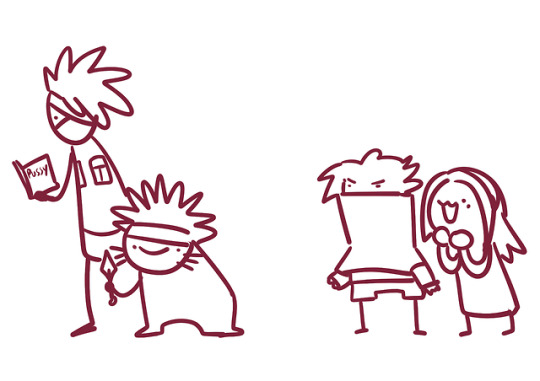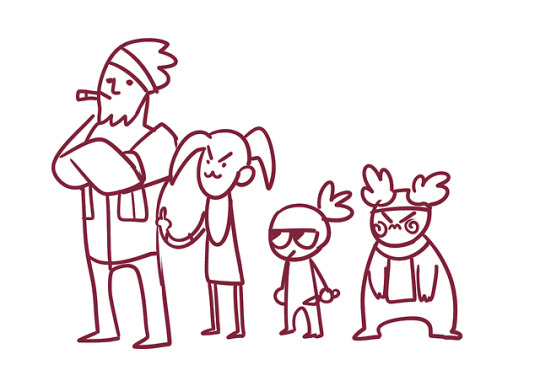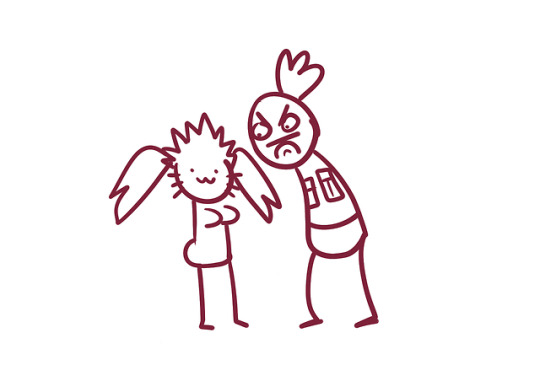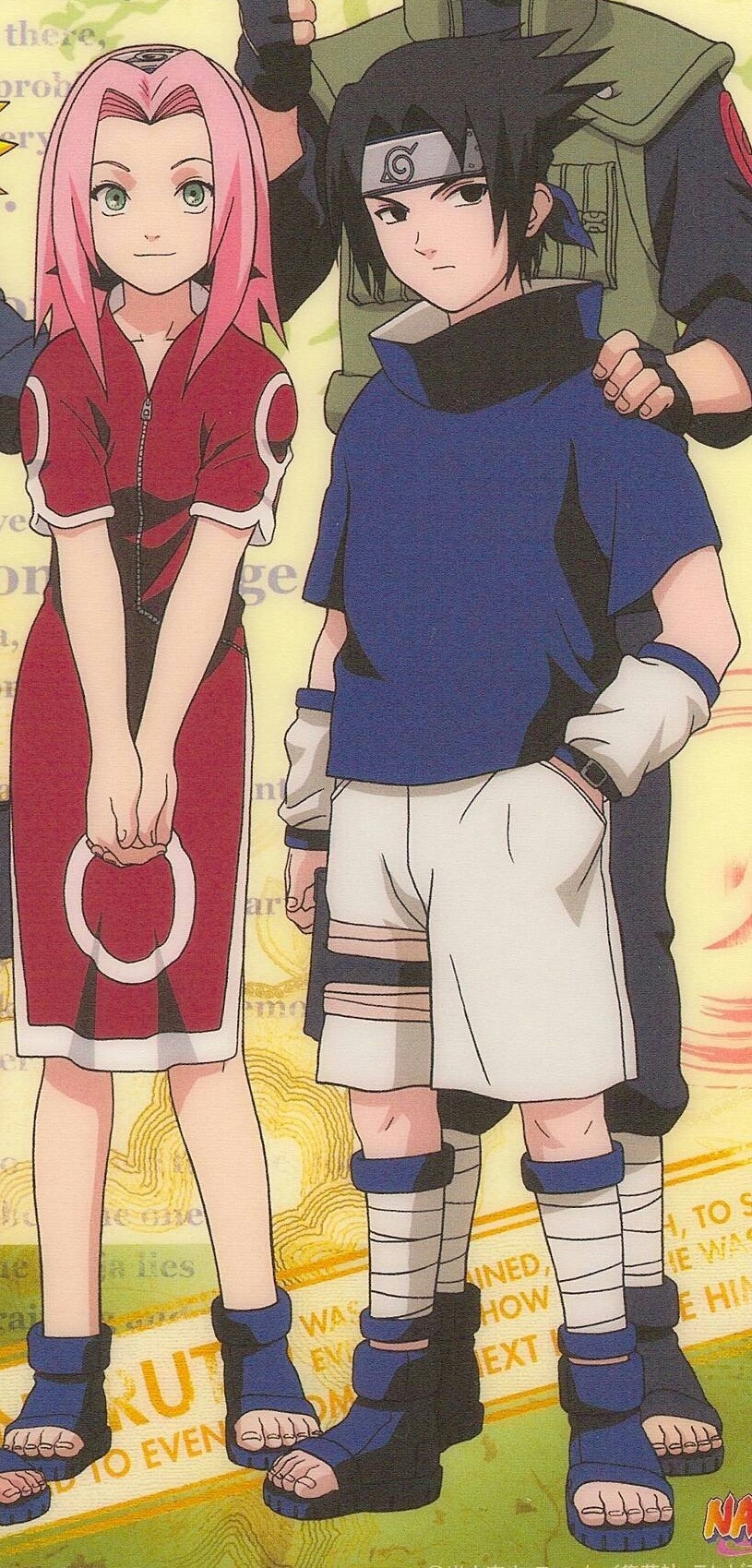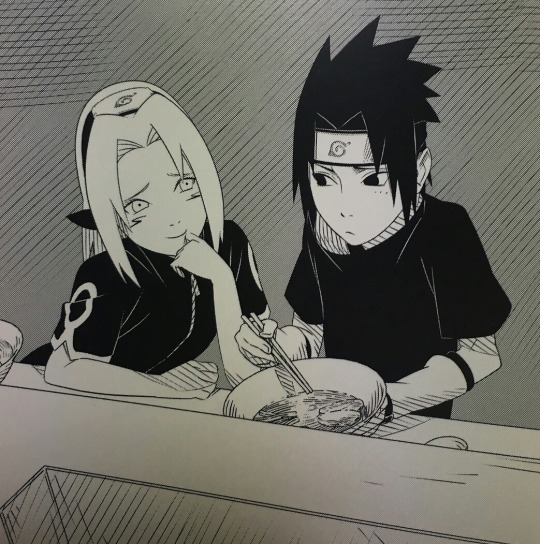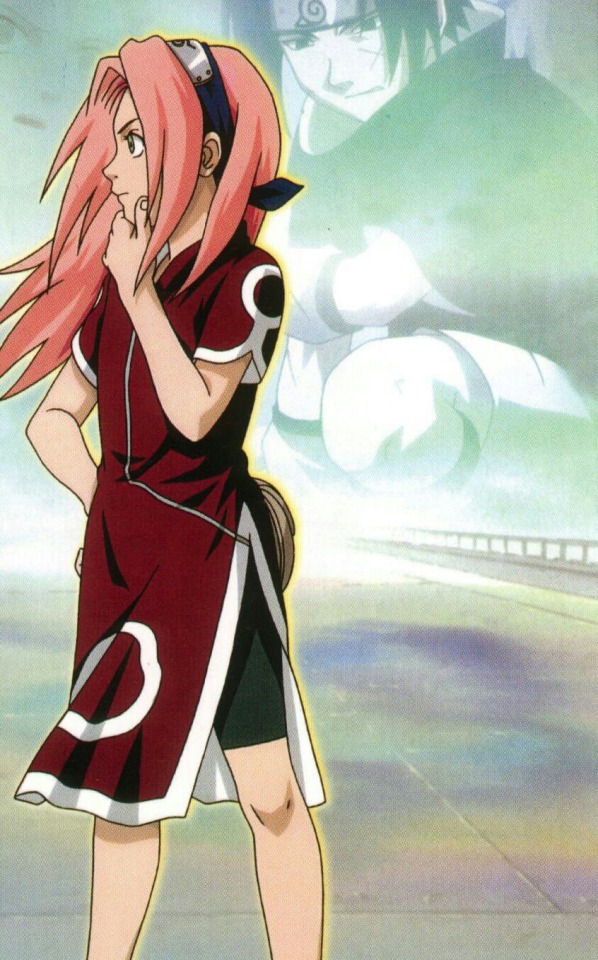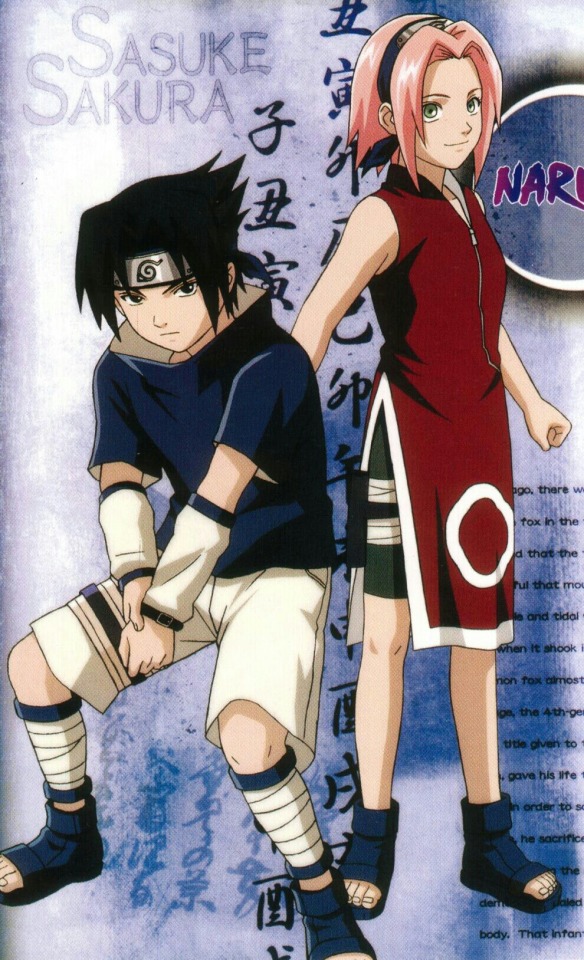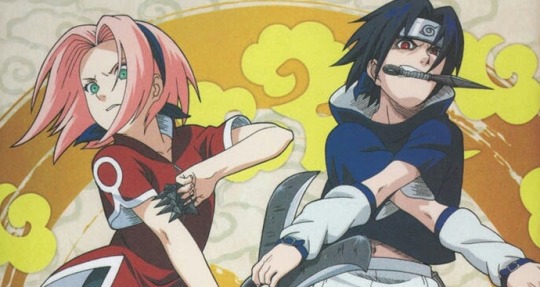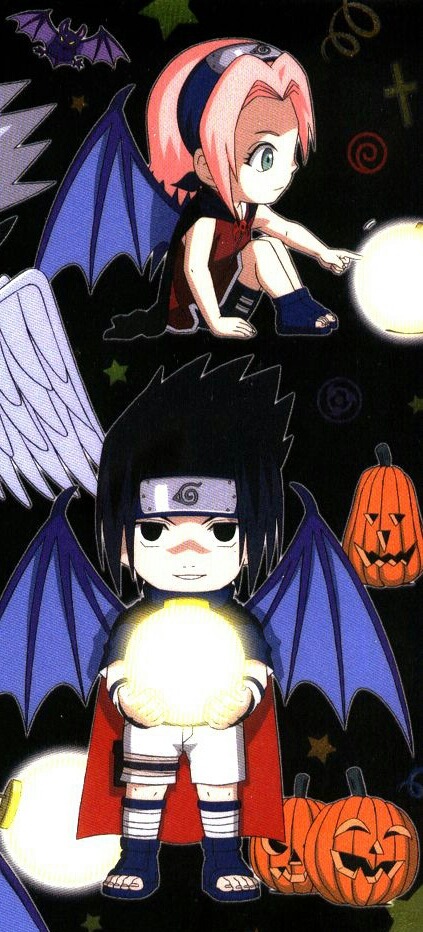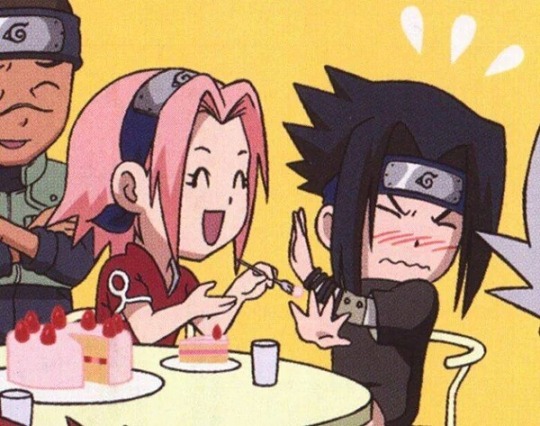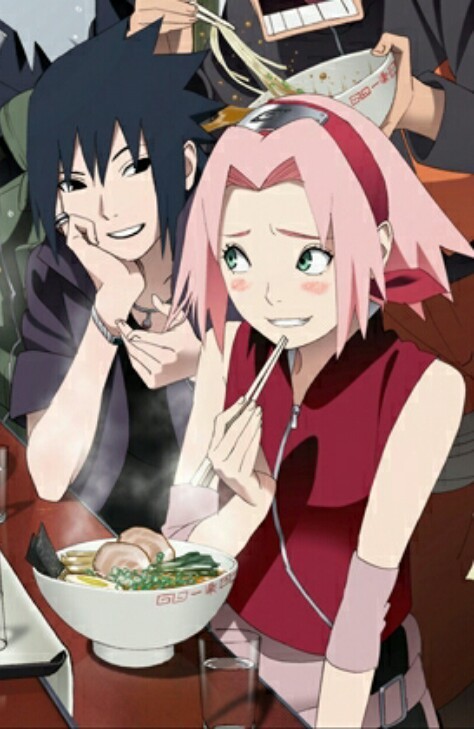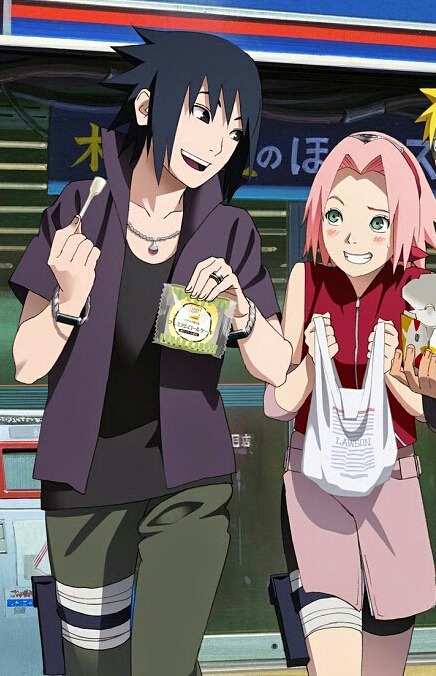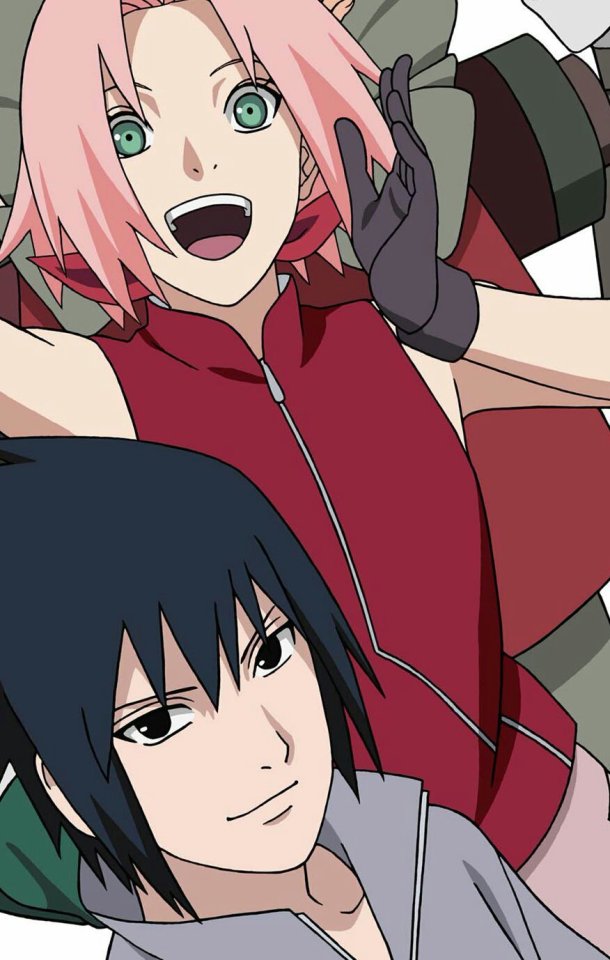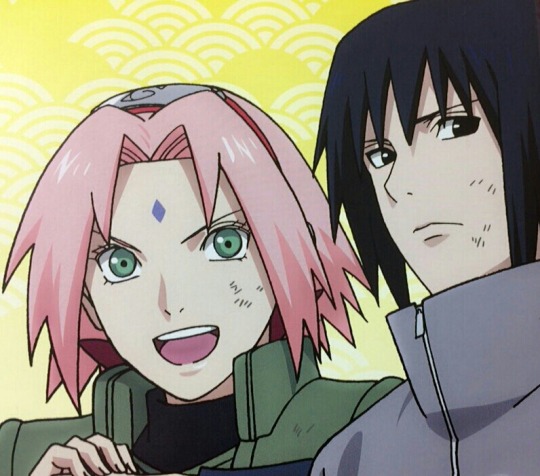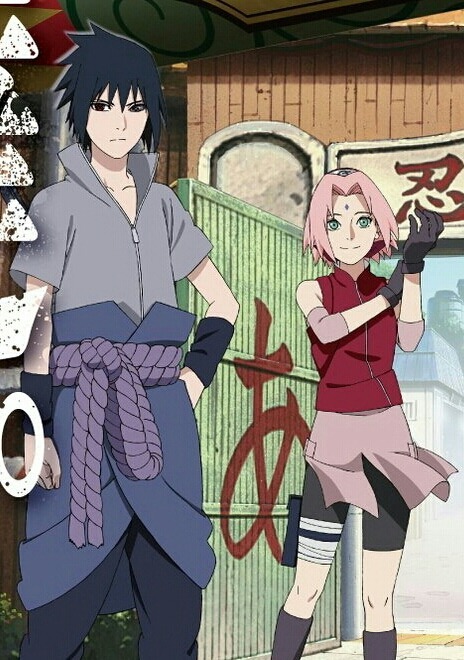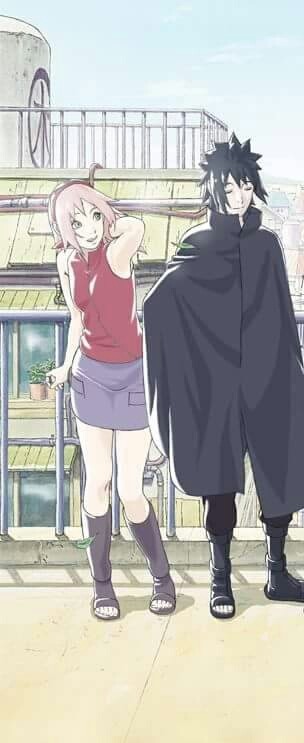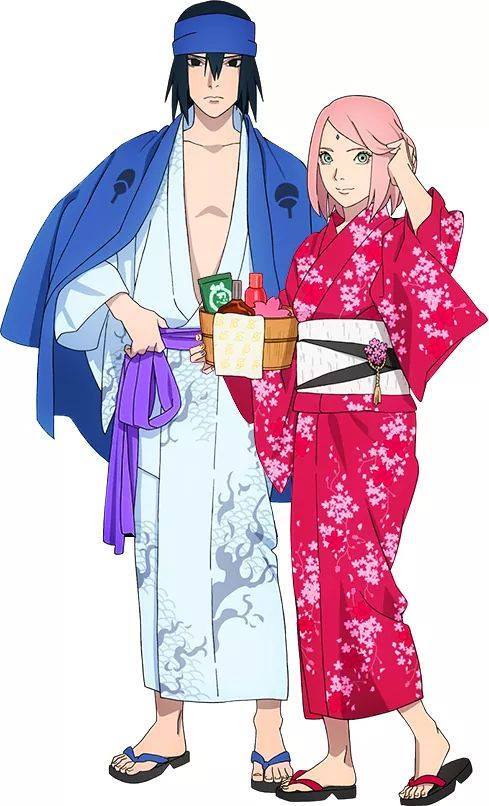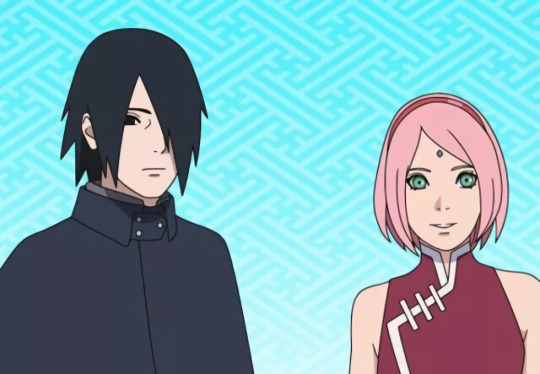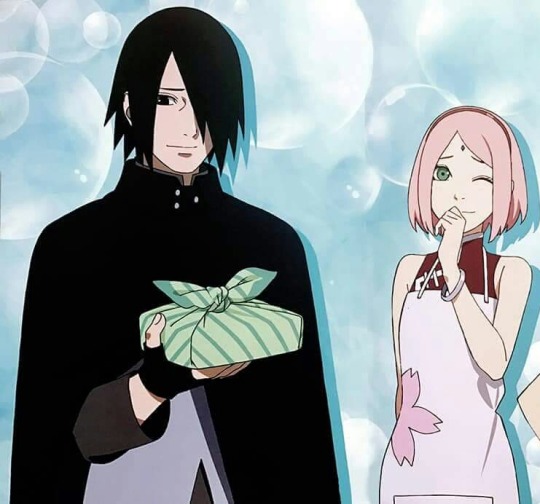Text
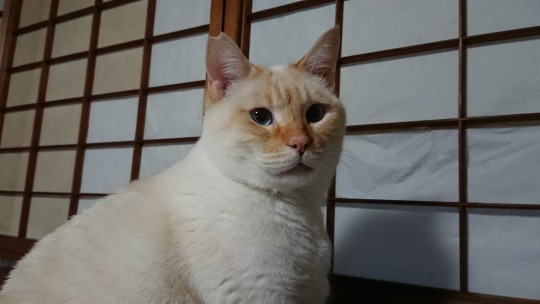
家主は…オレがしょうじにシワをつけたと?
Hey landlady, do you say I crinkled this paper slide door?

むー……
Hmmmm……
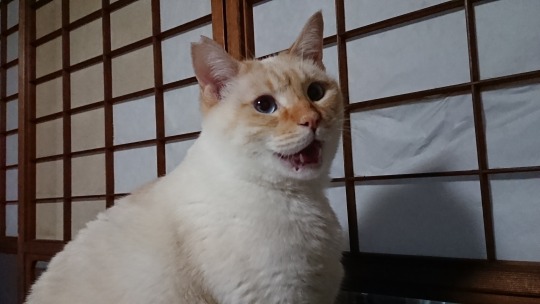
そうですよ!オレですよ!オレがやりましたよ!
That’s true! I did! I crinkled this!
125K notes
·
View notes
Video
tumblr
If we’re all going down I'm going the way I lived, making shitty memes in the face of peril.
238K notes
·
View notes
Text
Article 13
I hope you all realize this is more than just “losing memes and fan art”
This affects how content is shared online. Period. This is censorship. If this is implemented it opens the door to the government deciding what you can share and when.
“Web services large and small might decide to implement the directive globally, which would diminish American users’ capacity to share memes, political satire, or news articles online.” (Meaning due to the European law, websites might just change how they operate world wide, so the rules placed on them they will probabaly inforce in countries who don’t have the law)
If this could affect Americans in this way, imagine how heavy handed it will be on those who actually live in Europe??
This is a way to control what you do, say, think and read. It’s put under the disguise of “copyright” protection, but you are a fool if you think that’s what this really is.
10K notes
·
View notes
Photo






Adult Team 7 - Drawn by Kishimoto, Ikemoto, & Taira
214 notes
·
View notes
Text
Reblog if you love Sakura Haruno and Sarada ❤
My goal is to get 1,000 notes!!! It’s sad that people hate Sakura and now Sarada. Sakura and her daughter are both beautiful and strong girls!
2K notes
·
View notes
Text
Entering the Venom/Symbrock fandom
Expectation: Lots of alien tentacle porn
Reality: Domestic fluff, genuine affection, a man and his alien symbiote living happily ever after (and also lots of alien tentacle porn)
3K notes
·
View notes
Text
Never forget the sd sasusaku moments XD(UPDATED)



lee(imagination/dont remeber well): “but another man won her heart with an emerald more beautiful than the ocean”

parallels (sasuke feelings=sakura feelings)

Sasuke(not full translation): “When her vest is destroyed her defense is down; but attacking powers will rise”








Kiashi: “why did you hurt my daughter” sasuke: “uhhhhh”(note: zero percent sure whether this is an accurate translation i used google translate by taking a picture)



(Sasuke): I’m home~
Karin: !
Sakura: Welcome home dear ♥
Karin: He’s already married with another woman!!
Sakura from the Leaf class next to ours!!
Sakura: You’re working so much for our daughter and the loan of our home ♥
Karin: They even have a daughter and a house of their own!!



“so that she will be calm”


“sasuke kun you idiot”

Translation (boruto sd sasuke on actual oreo cookies wrapper sol in japan): “Sakura! You are a new light to me”???!!






Boruto: “Married wife harem sexy no jutsu”
Sasuke: *turns on sharingan* it appears to be bigger than the real thing
Sarada: PAPA!?

(lol yes itachi, sasuke finally had sex…your brother is no longer virgin)

(happy family)


“he’s just helping mama out!”

Sarada: *cooks for her fam*
sakura: “you seem happy dear”
NOTE: if you have better translations for some of these pages please be free to add them
1K notes
·
View notes
Text
For SasuSaku fans
Reblog if you are a true SasuSaku lover and a true Sakura fan
354 notes
·
View notes
Text
Sasusaku vs Haters
1)Sasuke never bothered to tell sakura anything
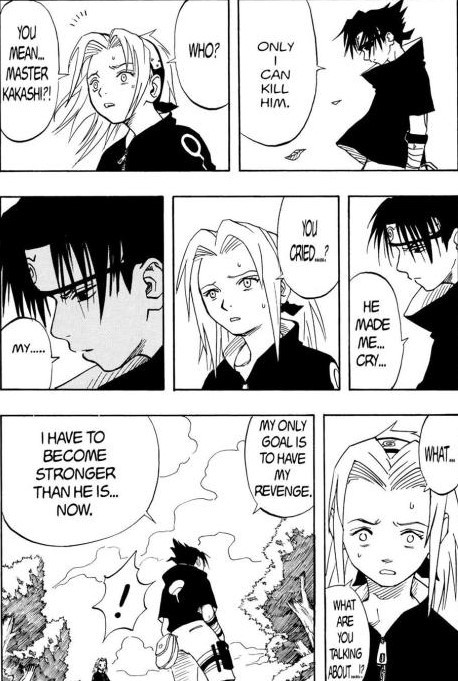
2)Sasuke never blushed around sakura
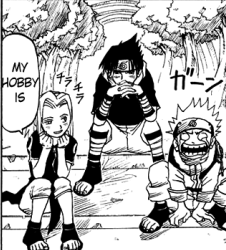
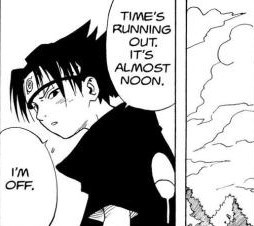
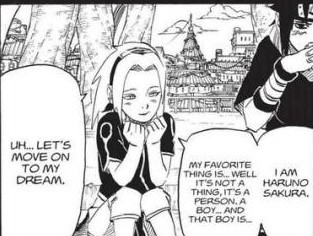
3)Sasuke is uncomfortable around Sakura
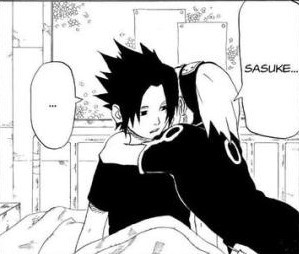
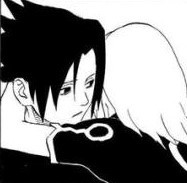
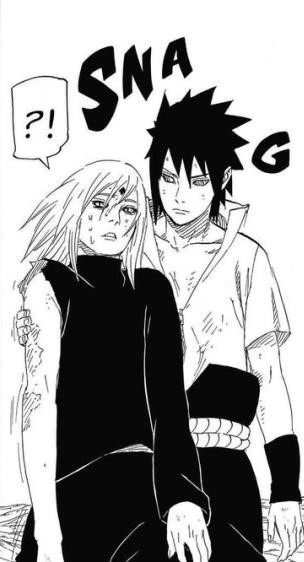
4)Sasuke was never jealous
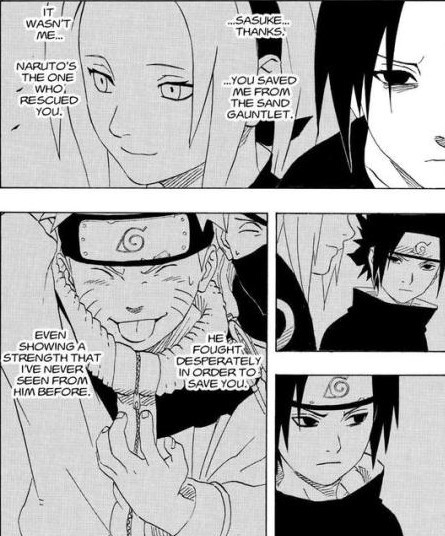
5)Sasuke never bothered with Sakura’s confession
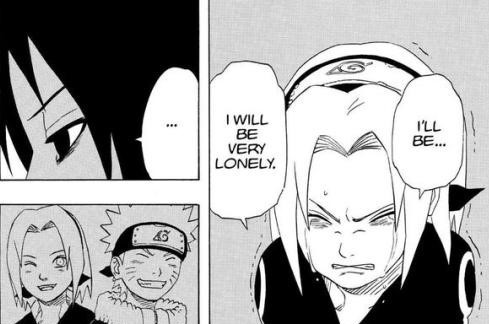
↳ A picture frame faced down. By now, the moonlight has no way of basking it…
【別れ】 「遥かなる、闇へ...歩き出したサスケの前に、現れたのはサクラだった。 振り向くことなく立ち去ろうとするサスケの背に、サクラは必死で想いを投げかける。サスケを失いたくないと いう、まぶしいくらいに一途な想いを。 孤独だった自分の存在を愛情という想いで満たしてくれたのがサクラだった。だが、その想いに応えることはや はりできない。サスケは、ただ一言の感謝の言葉を、別れの言葉として告げることしかできなかっ たのだ。」
↳ 【SEPARATION】 Growing distant, towards darkness. The one to appear before him as he began leave was Sakura. To the back of a Sasuke that tried to avert from what was being left behind, Sakura desperately conveys her feelings. Bright and earnest feelings - feelings that did not want to lose Sasuke. The one who filled his lonely existence with the emotion called love was Sakura. But, as expected, Sasuke cannot respond to those feelings. Sasuke was only able to leave a single word of thanks as word of parting.
► chap. 181 サスケ:「また...ここからそれぞれ新しい道が...始まるだけだ」
↳ Sasuke: I’ve walked the path with companions. Now I walk the lonely path of revenge.
► chap. 181 「最後まで己を必要としてくれたサクラ。口を突いた言葉は、サスケの偽らざる本心だ。」
↳ Sakura, who needed him to the last. His words are not a deceit but his true feelings
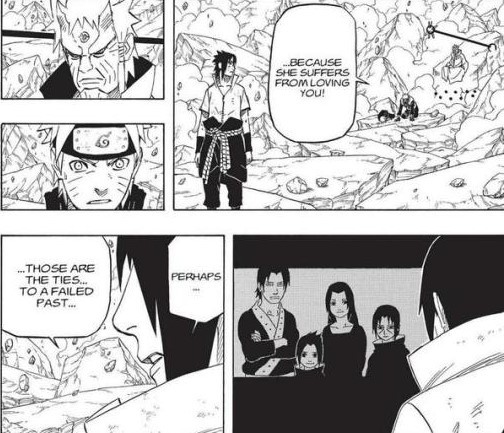
6)Sakura had no effects on Sasuke
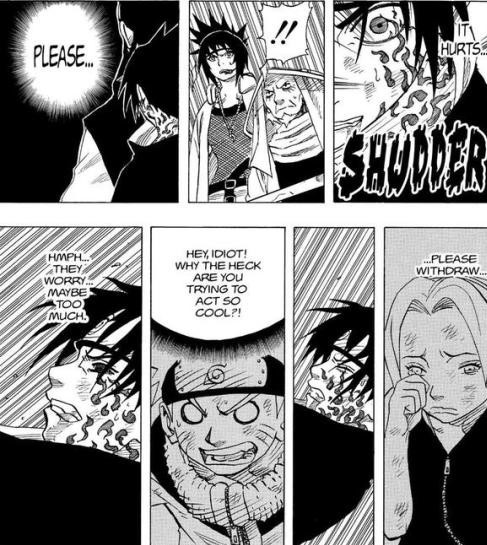
7)Sakura never helped Sasuke
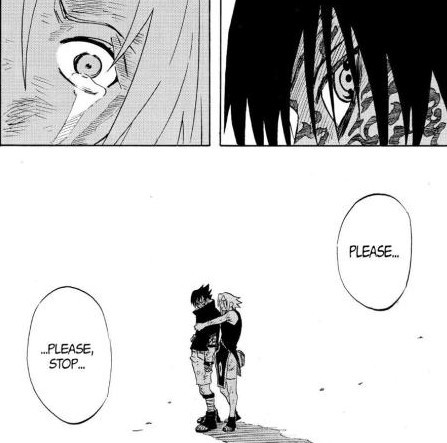
↳ ENCOUNTER WITH FRIENDS WHO CAN EASE HIM FROM LONELINESS!!
【仲間】 「それまで恋や友情に見向きもしなかったサスケは、ナルトやサクラと出会い、少しずつではあるが、仲間を受 け 入れ始める。サスケにとってナルトは、いつの間にか互いの能力を高め合う良きライバルとなり、 また大蛇丸の 邪悪な呪印にのみ込まれんとするその心を、サクラに救われたことも... 」
↳ 【COMPANIONS】 Though until then he had taken no notice of either love or friendship, after meeting with Naruto and Sakura Sasuke begins to accept them as nakama, even if only little by little. In Sasuke’s eyes, before he even noticed it, he and Naruto became mutual good rivals capable of boosting up each other’s skills - and also, when his heart was about to be swallowed by Orochimaru’s wicked cursed seal again, he was rescued by Sakura…
「呪印の影響で暴走するサスケを身を挺して鎮めるサクラ。サクラのサスケを想う心が、邪な力を 包 み込む。」
↳ Sakura willingly and bravely calms the rampaging Sasuke under the influence of the cursed seal. Sakura’s heart, thinking of Sasuke, devours the wicked power
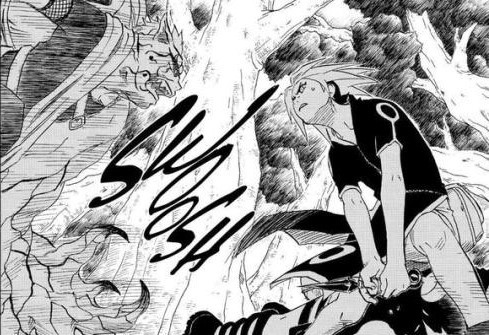

“Sasuke-kun, do you like Sakura-chan? Is she important to you?” Sasuke: She is an important member of Team 7, she has helped me many times.

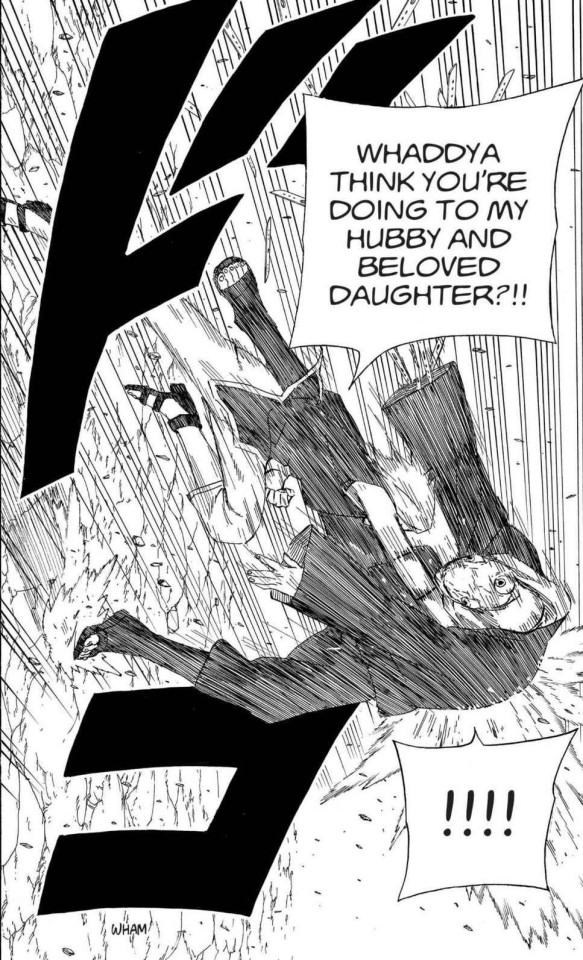
8)Sasuke always insulted Sakura’s worth
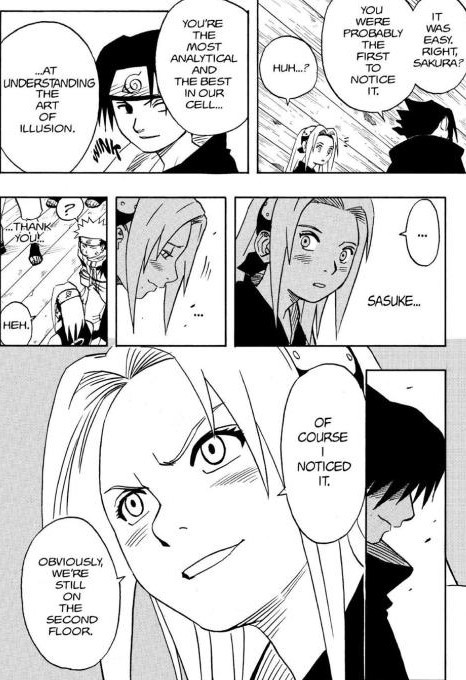
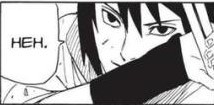
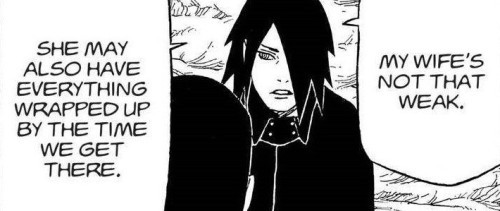
9)Sasuke never thought of Sakura
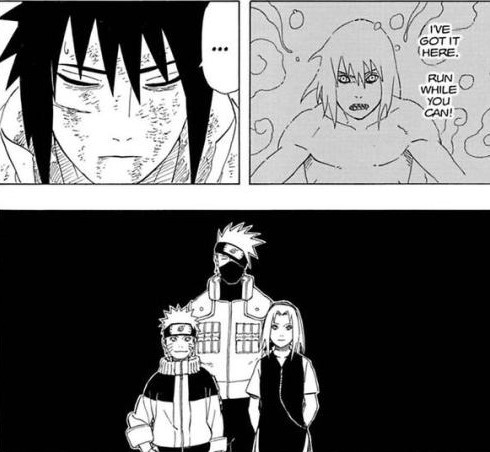


10)Sasuke who tried to kill Sakura was the real Sasuke

11)Sasuke dosen’t care about Sakura
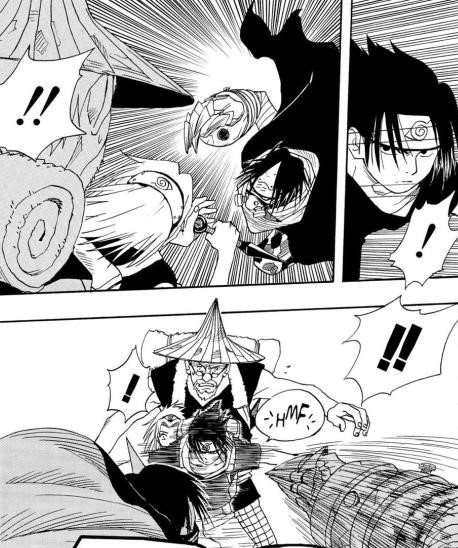
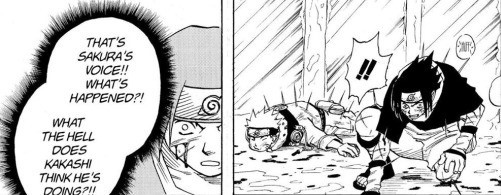

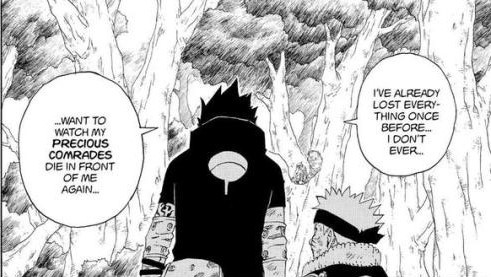
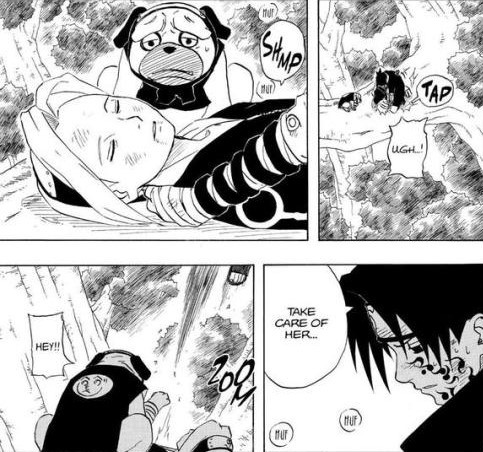
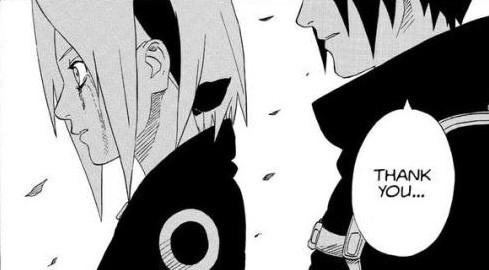

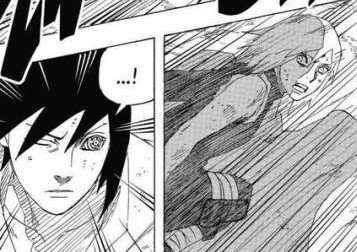


12)Sakura never talked back to Sasuke
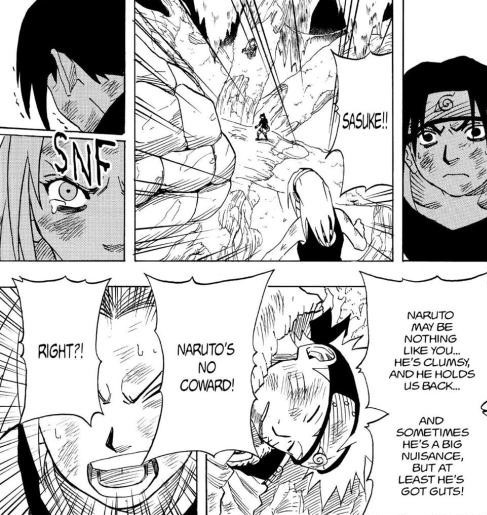
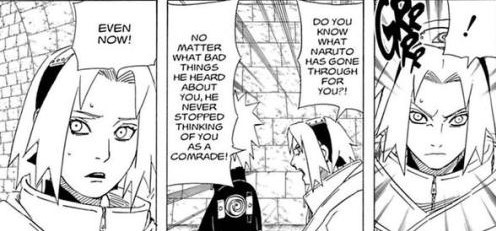
13)Sasuke left Sakura to fall in the lava


14)Sasuke left Sakura traumatized
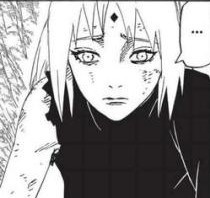
15)Sasuke never properly apologized with Sakura
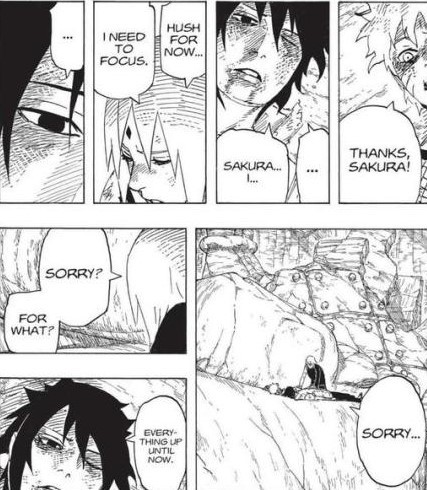
16) The forehead poke was a rejection

An important aspect to the forehead poke was the phrase 「また今度だ」”Mata kondo da” that Itachi used, which translates to “Maybe next time.”
But when Sasuke did the forehead poke with Sakura he said 「また今度な」”Mata kondo na” which translates to “I’ll see you soon.”
A slight difference in words that establishes a big gap in certainty.
17)Sasusaku came out of nowhere

What do the stars say about Sakura and Sasuke’s couple?
Sakura is in love with Sasuke, but does she have a chance? We had an unexpected result, who would say …?!
The compatibility between their signs is: 80% ♥ VERY GOOD.
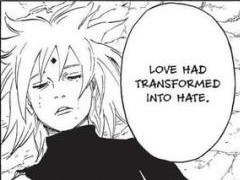
↳ 【DREAMS AND FRIENDS】 Friendship and love, a future filled with warmth. But as long as he is there, he cannot make his dream come true. This is why he throws away a future with his friends. To make dreams of revenge a reality…
The one who filled his lonely existence with the emotion called love was Sakura.
Kishimoto: For me the most difficult scene was the parting between Sakura and Sasuke. They looked like lovers and it was sort of embarrassing.
18)Sasusaku aren’t married
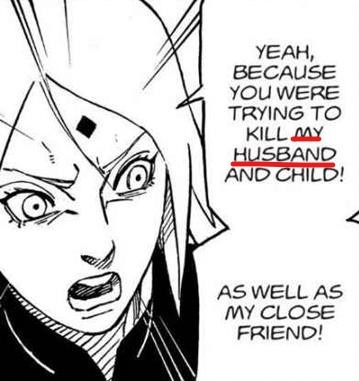
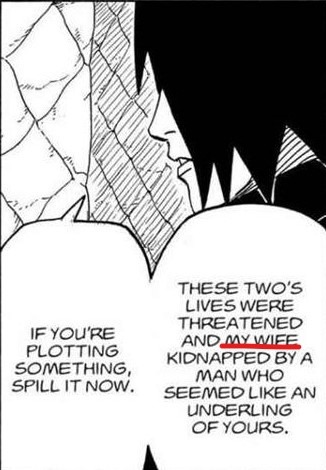
19)Sasuke abandoned his family
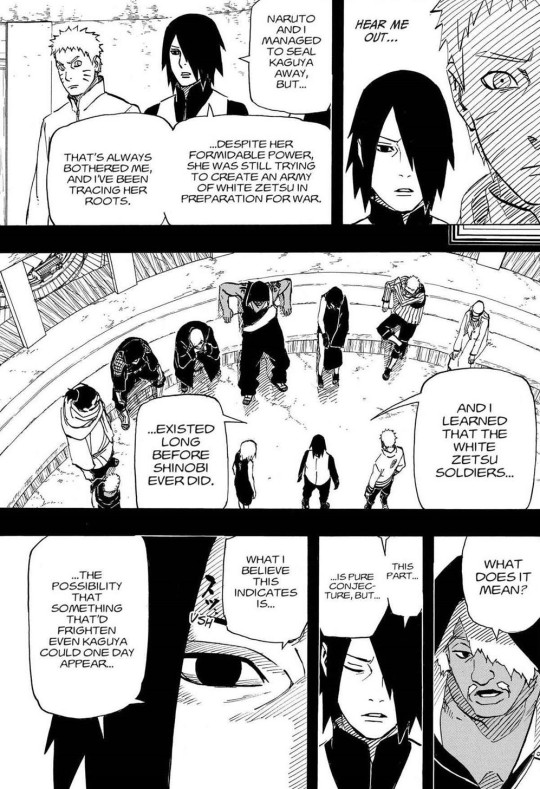
20)Sasuke impregnated Sakura and ran off

21)Sarada was traumatized by Sasuke

22)Karin is the mother


23)Sarada hates Sakura

24)Sasuke dosen’t care about his family
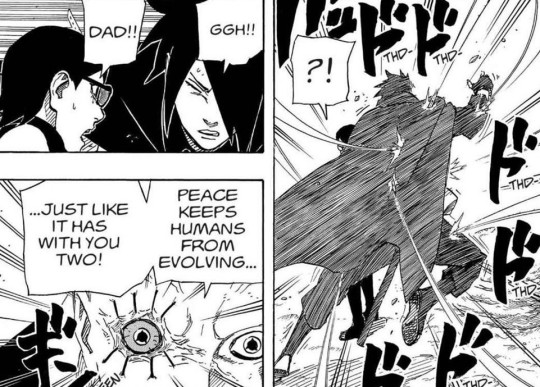
25)Sakura is miserable
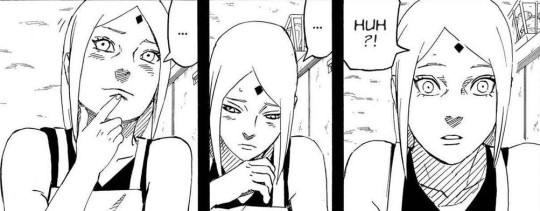
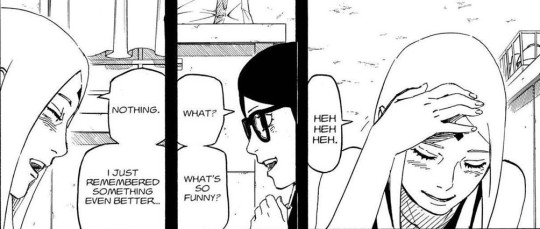
26)Sasuke isn’t happy
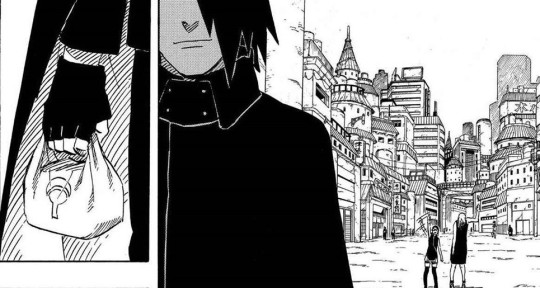
27)Sakura is a shitty mom
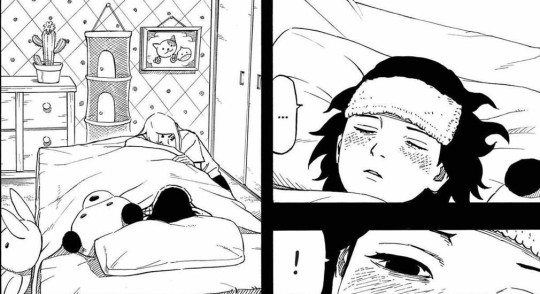
28)The Uchiha family is miserable
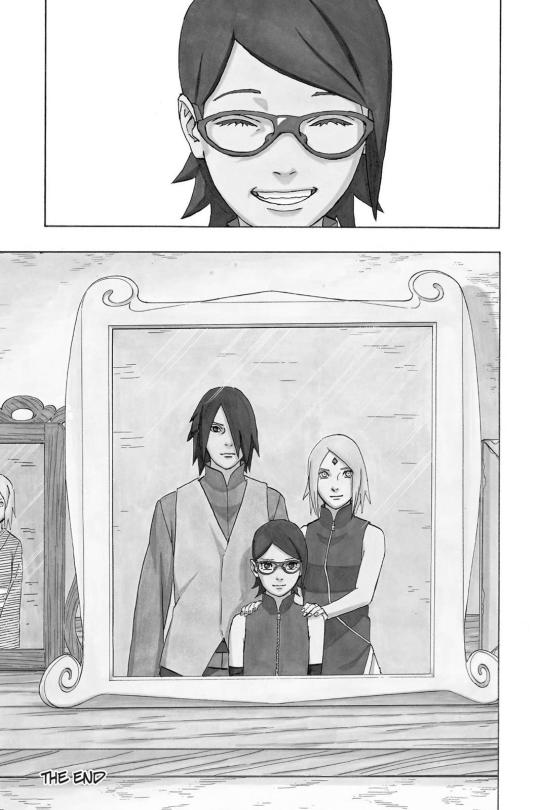
29)Sasusaku aren’t in love

30)SASUSAKU MAKES NO SENSE!!!!

5K notes
·
View notes
Text
i cover my nipples, not because of some stupid law, but for the same reason kakashi covers his sharingan
78K notes
·
View notes
Text
If you’re scrolling through tumblr trying to distract yourself from something you don’t want to think about or you’re looking for a sign that everything will be okay, this is it. So, breathe. Relax into this moment. You’re alive & that’s all that matters.
627K notes
·
View notes
Text
Certainty in Sasuke’s 「また今度な」“Mata kondo na” in Comparison to Itachi’s 「また今度だ」”Mata kondo da”
I happened to find a tumblr blog that pinpoints difference between Sasuke’s and Itachi’s 「また今度」mata kondo dialogues. There, the blogger thinks Sasuke’s dialogue shows more emotion, emphasis, and remarking meaning of sentence. It implies strong desire, even if it is something hard for the speaker to do. I feel like have to exaggerate things because brief explanation is just not enough to fulfill a crazy fan girl’s need.
For the sake of proper writting, let me give reference in advance regarding what dialogues I will talk about:
「また今度だ」”Mata kondo da” refers to some dialogues spoken by Itachi to Sasuke in various occations in their past before the Uchiha Clan Downfall. It is often translated as, “Maybe next time.”
「また今度な」”Mata kondo na” refers to a dialogue spoken by Sasuke to Sakura by the time he departed from Konoha (Naruto, 699:15). It is often translated as, “I’ll see you soon.”
Both of dialogues have similarity in「また今度」 mata kondo part, in which literally 「また」mata means ‘again’ and 「今度」kondo means ‘this time’ or depends on the context it can also be ‘next time’. Mata kondo in general is used to politely decline an offer.
The only difference between two dialogues is that Itachi used 「だ」da, whereas Sasuke used「な」na in the end of sentence. This slight difference, however, makes all the big gap regarding the volume of certainty the speakers indicate in their speeches.
ITACHI’S「また今度だ」MATA KONDO DA
To be honest, I am not quite sure which group da is belong to, as some people say it a copula and some others consider it as a particle. The first group states that da is equivalent to English to-be and working as if it were verbs when it is combined with noun (used to predicate sentences). But it is not fully correct since for sentences in which a copula is required in English, the corresponding sentences in Japanese do not require a copula [Dalrymple, in Kusutani]. Japanese verbs are also not conjungated for person or number although they do change in forms to reflect honorific considerations that have to do with respect, humility, and politeness [Cipris, in Kusutani].
I don’t want to give you headache, so I will just skip all these debates and focus on practical usage of da.
Da plainly completes a sentence. If you add da after a noun, it makes a full sentence. For example, sakana means fish, but sakana da means “(It’s a) fish
Da expresses existence of something or shows certain thing is. When you say, “sakana da,” it may refer something that is indeed a fish, or refer to the availablity of the fish
Da is sometimes used to replace other parts of a sentence when all person involved in conversation are clear with the context. For example: a customer in restaurant say to the waiter, “Watashi wa unagi da.” (lit. I am an eel). Of course, the person does not claim himself as an eel. The more proper meaning will be “I want to order eel.” However, it is not necessary to explain it in full sentence, since both parties have understood the context.
Da always declarative, never interrogative (although, there are some examples that make me unsure about this point)
Da expresses assertion. According to online dictionary, assertion is positive statement or declaration that often without support or reason.
Regarding its differences with desu:
Desu is more formal and polite than da. Thus, many sentences are almost identical in meaning and differ in the speaker’s politeness to the addressee and in nuance of how assured the person of their statement
Both desu and da express assertion, but desu is less assertive than da
Unlike da, desu can be used in interrogative sentence
Da is somewhat manlier than desu
From literature approach that has been explained above, in my opinion, da in Itachi’s dialogue “Mata kondo da” has following usages:
(1) To plainly complete a sentence
(2) To express assertion
(3) To note casualty in the relationship and manly way of speaking
The direct translation of the said dialogue is “(It’s) next time again” and contextually translated as “Maybe next time.”
“Mata kondo” it is a polite statement of rejection by making promise for future chance. However, in the promise, there is tone of assertion. You can say that the speaker is basically uncertain about the promise. It is made without much willing from the speaker, and in certain level, can be considered as an empty promise.
Character Wise
Itachi Uchiha was only four years old when Third Shinobi World War broke out. Traumatized a lot by all the dreadful happenings, the young Itachi loved peace so much that he wanted to keep it no matter what it might cost. He began to learn history and his exceptional intelligence had made his horizon greatly widen; he saw the far future and became very concerned about it. He was even stated to have wisdom that was on par with a Hokage’s at such a young age.
Natural prodigy that passed Chuunin Exams at age 11 and was promoted to Anbu captain by age 13, Itachi was used to take very big decisions that none ever could dream of. Something that even a Hokage was feeling very remorse to know the burden on the young boy’s shoulder.
Before the night of Uchiha Clan Massacre, Itachi was really close to his brother, Sasuke. He loved him so much and paid attention to him in way his father did not. He watched his brother progress whenever he had time to. But, how could he have time if he was already occupied as double agent?
Despite his love for his brother, Itachi was rarely home and not able to keep eyes on Sasuke’s training. In the end, he could only reject his brother plead by saying “Yuruze Sasuke … Mata kondo da” (lit. Forgive me, Sasuke … Maybe next time) while poking Sasuke in forehead.
I’m quite sure the lack of certainty his promise due to the difficult position he was in. Double agent job obviously didn’t let him to have spare time. He was aware that he might not be able to fulfil the promise, yet he couldn’t bring himself to directly refuse Sasuke.
PART 2: SASUKE’S「また今度な」MATA KONDO NA
I have explained about Japanese sentence-final particles (shuujoshi) in my another post, so you can skip this part if you still remember the whole explanation. But in case you forget, the following paragraphs are what sentence-final particles is.
Sentence-final particles (shuujoshi) are group of Japanese particles located in the end of sentence. The basic function of sentence-final particles is to express the speaker’s feeling or to seek confirmation from the addressee. Sentence-final particles are essential in spoken Japanese. These determine or greatly alter the function of the sentence. The speaker also must intertwine his/her emotion into the speech to make it seem relevant. By dropping the sentence-final particles, your speech will get less impression. Adachi [2002:261] stated that not using final particle at all gives the impression that the speaker isn’t really interested in what is said.
Basically sentence-final particles give volume to the speech, or in certain point, are the heart of the speech as it carries the speaker’s tone as well as impression. In addition, sentece-final particles also indicate territory of information, which means it determines to whom the information (aka the speech) belongs. Territory of information is divided into four: (1) the speaker’s but not the addressee’s; (2) not the speaker’s but the addressee’s; (3) both the speaker’s and the addressee’s; (4) or belonging to neither the speaker nor the addressee.
Japanese is very subtle as they often drop the subject and sometimes the object of the sentence. Understanding of sentence-final particles may let you know about how the speaker truly feels when he/she delivers the speech, whether the speech is direct or indirect, and whether or not the speaker needs a feedback from the addressee.
Sentence final-particle na (from now on is particle na) is basically used to give confirmation or agreement in the sentence, to express the speaker’s feeling, emphasizes expressiveness, and stating hope or desire.
Particle na according to Moriyama [1998:174, in source] has contexts as following: (1) to express impression and awe; (2) to state desire; (3) to indicate decision and politely asking; (4) to ask agreement, get answer; (5) when it is following a command, it will make the command more polite.
Tomita [1991:171, in source] states that particle na has following functions: (1) to prevent; (2) to give command; (3) to express the speaker’s emotion or feeling; (4) to emphasize the topic or statement to the addressee; (5) to make the addressee agree or have same opinion with the speaker; (6) to emphasize personal opinion; (7) to make sure to the speaker him/herself about what is he/she thinking or doing.
Particle na has special property to convey a tone of ‘camaraderie’ [Naomi Ogi, 2014].
From the explanation above, particle na in Sasuke’s dialogue “Mata kondo na” has following usages:
(1) To express the speaker’s emotion or feeling
(2) To state strong desire
(3) To emphasize the statement
(4) To make the addressee agree or have same opinion with the speaker;
(5) To make sure to the speaker him/herself about what is he/she thinking or doing.
Like Itachi’s dialogue, Sasuke’s dialogue is also a polite statement of rejection by making promise for future chance. However, there is big difference regarding the speaker’s will of what is being said.
This dialogue has indeed implied that the speaker does really mean what he says. He puts his emotion and feeling into the speech and indicates a strong desire to fulfill the promise. There is big amount of certainty in what is being said.
Particle na in this is dialogue is meant to both the speaker and the addressee. So, it’s important to him to make the addresse agree with his opinion, while he basically makes the promise to himself.
Character Wise
Sasuke was seventeen years old when he stated that he would do a revolution. In order to accomplish his goal, he needed to cut his bound to everyone from the past, especially from someone who had filled his lonely existence. Someone who was precious to him in golden old days and whom he had tried to kill more than once. He was prepared to take all the hate with him and walk in the darkness alone.
But Sasuke got his senses knocked back to him and realized that he was wrong. He then brought himself to ask forgiveness from someone whom he needed to apologize the most: Sakura. He apologized and she forgave him. She was kind and loving as ever. In parting days, Sakura even went as far as asking to join his journey. He refused her. She was not part of his sins, so she could not join him.
She didn’t seem to understand as she looked so depressed. It might be because of it, Sasuke wanted to make everything clear with her by saying, “Mata kondo na … Arigatou.” (lit. I’ll see you soon … Thank you.)
Sasuke was never a man with words. However, regarding Sakura, he always conveyed his heart directly. This time, Sasuke made the promise and the way he said it indicated that really meant it. He puts his emotion and feeling into the speech and indicates a strong desire to fulfill the promise. It’s important to him to make Sakura agree with his opinion by emphasizing it, while he basically makes the promise to himself.
—
And with that, this long rambling has come into conclusion. I am too lazy to sum it up with neat sentences, so forgive me for this improper ending after all the ruckus I have already started.
Basically “Mata kondo” is polite statement of rejection by making promise for future chance. Both of Itachi’s and Sasuke’s dialogue carry the same promise. However, there is different amount of certainty indicated in those dialogues.
In Itachi’s dialogue, there is tone of assertion. Itachi was basically uncertain whether he was able to fulfil the promise, or aware that he might not be able to fulfill the promise, yet he couldn’t bring himself to directly refuse Sasuke’s plead.
In Sasuke’s dialogue, there is strong desire from him to fulfill the promise. The dialogue is meant to both Sakura and Sasuke. So, Sasuke has promised not only to Sakura, but also to himself. And it is important for him to emphasizes this to Sakura, as well as make her agree with his opinion.
—
I’m neither native in Japanese nor majoring Japanese linguistic, so there might be inaccuracy in my rambling and I am really, really sorry for that. My literatures come from online journals and articles and I want to add them if I have time. I hope this post is not as bad as I suspect it to be. If you find any mistake within the explanation, please kindly tell me so I can edit it out.
777 notes
·
View notes
